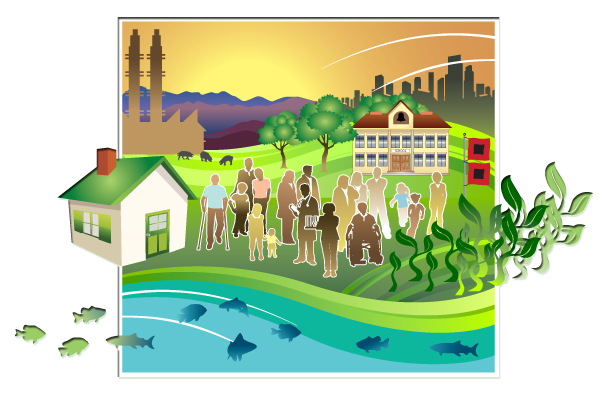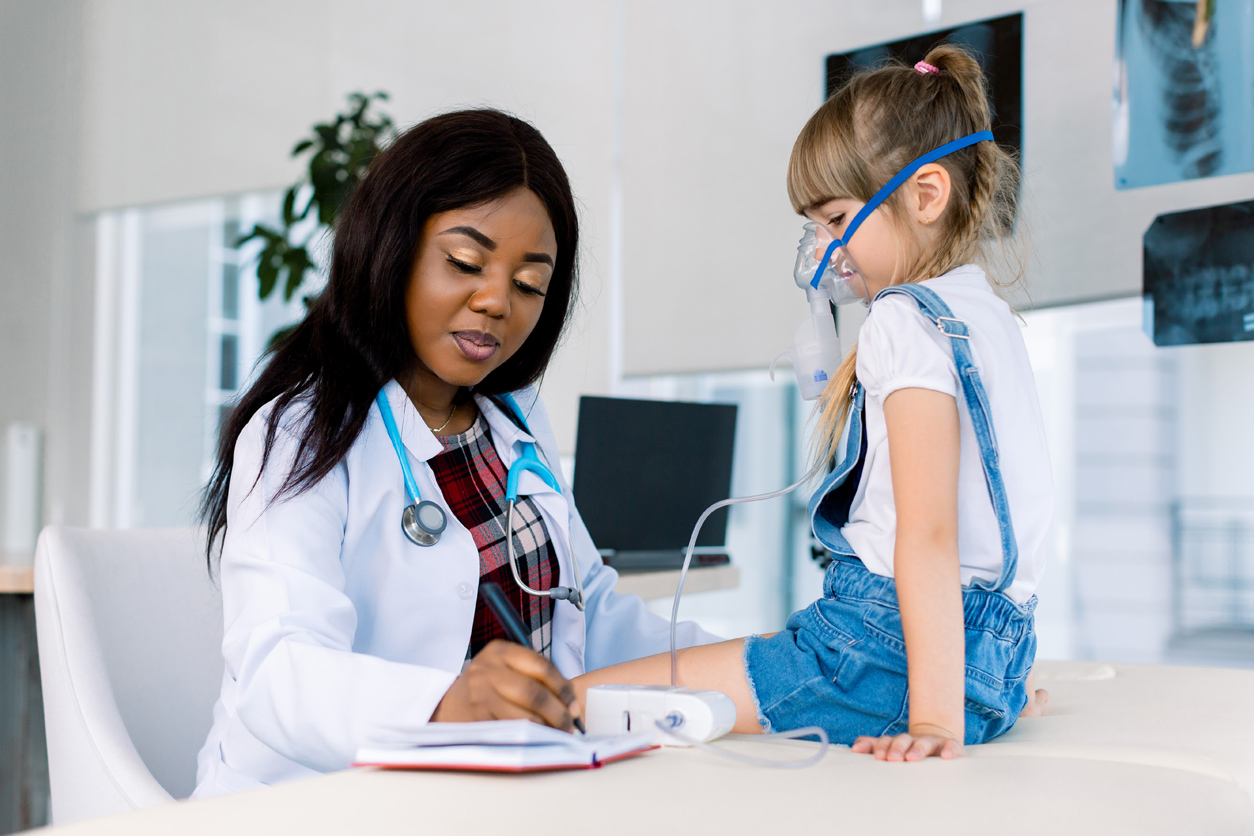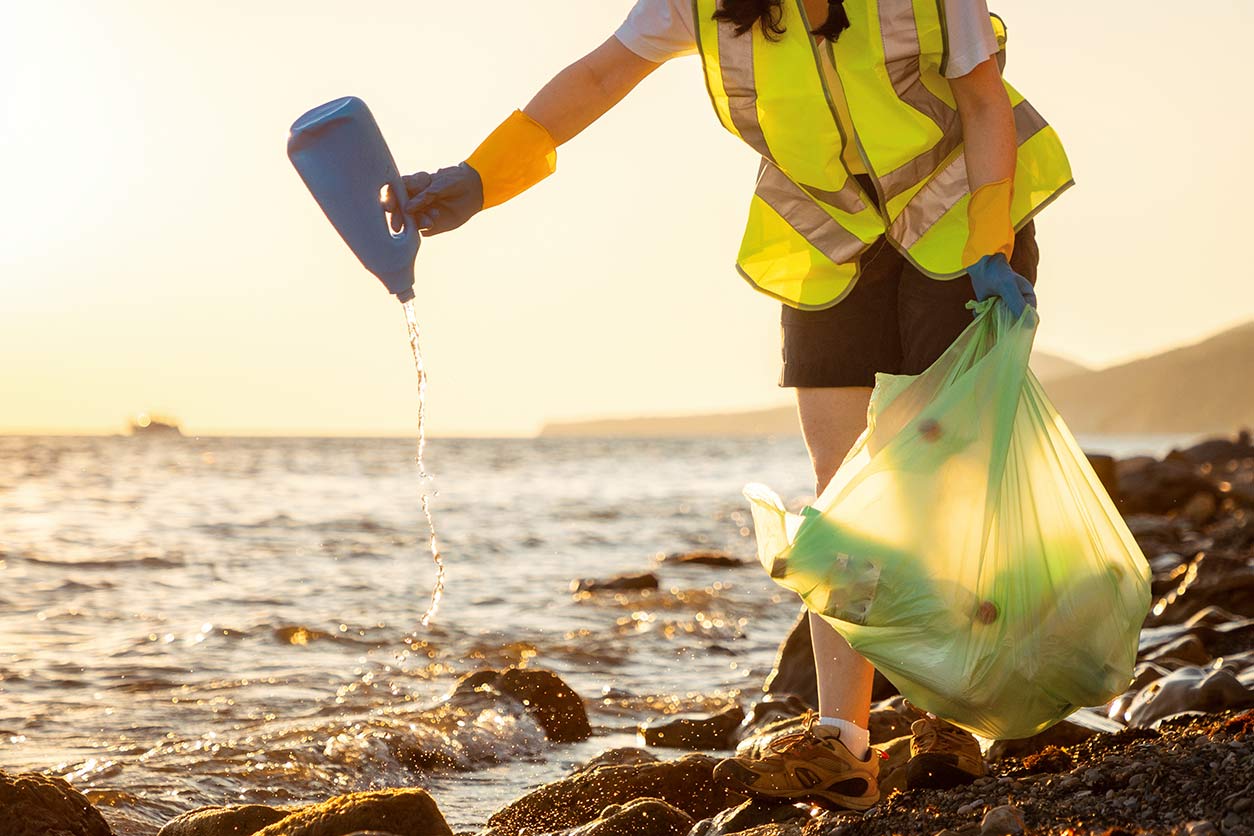Library Program Lends Radon Detectors to Rural Residents
Researchers from the University of Kentucky designed a radon-testing intervention with public library staff, citizen scientists, and community members. A February 2024 paper describes how the researchers, citizen scientists, and library staff created a library lending program for radon test kits and evaluated its usability, feasibility, and acceptability. Libraries can be innovative settings for public health interventions because they are highly accessible, with trusted community voices who already serve the public and are experts at lending materials and distributing information.
Lending out radon test kits from libraries made tests accessible to community members who would not have otherwise tested their homes, either due to lack of awareness of radon risk or inability to afford a detector or detection service. Community members also received support in completing radon tests and understanding the results from information provided in the kits, trained library staff, and community citizen scientists.
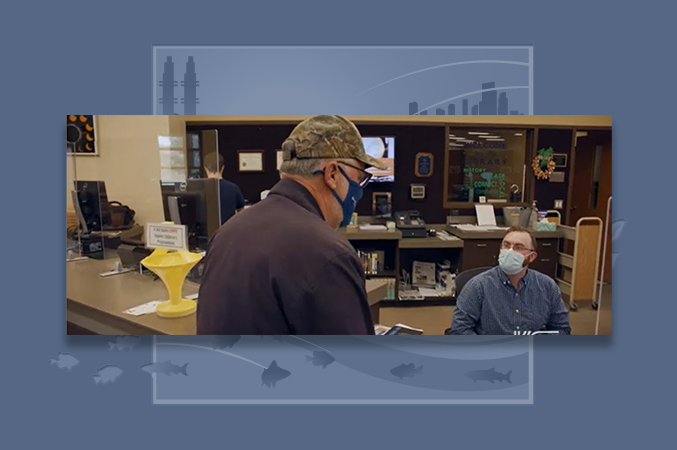
Logan County Public Library patron checking out a radon detector kit. (Photo courtesy of Ellen Hahn)
“This is the first study to test the usability, feasibility, and acceptability of a radon detector library lending program,” reflected Ellen Hahn, Ph.D., RN, lead researcher on the study. “It shows an effective way to get radon tests to people living in areas at high risk for radon exposure who may not otherwise test their homes due to lack of awareness or financial barriers.”
Exposure to radon is the second leading cause of lung cancer. However, many people are unaware they may be exposed in their homes. Radon, a radioactive gas produced by natural processes in some types of bedrock and soil, can enter homes and workplaces and become trapped inside. Radon is harmful to people when inhaled because its radioactive particles damage cells that line the lung. Because remediation can reduce radon concentrations in homes to the levels recommended by the Environmental Protection Agency (EPA), testing is an important public health intervention, particularly in areas where the bedrock and soil contain substances that can create radon and inside homes where tobacco smoke is also present.
Designing a Library Radon Detector Program
Researchers from the NIEHS-funded Radon on the RADAR (Residents Acting to Detect and Alleviate Radon) study identified four rural Kentucky counties with low rates of home radon testing. Counties were chosen based on radon potential and “matched” on county-level median income and population size. Researchers engaged with staff at each library in all four counties to develop the library lending program. Library staff and citizen scientists made several suggestions in designing the lending program, including having a user agreement for community members to sign when checking out a detector kit, what radon information to add to kits, what training library staff needed so they could effectively provide information to community members, and suggestions for marketing the program to the community.
The research team recruited 15 community members from each county to volunteer as citizen scientists. The volunteers learned how to test their own homes for radon and were invited to spread information about the lending program and recruit community members to participate.
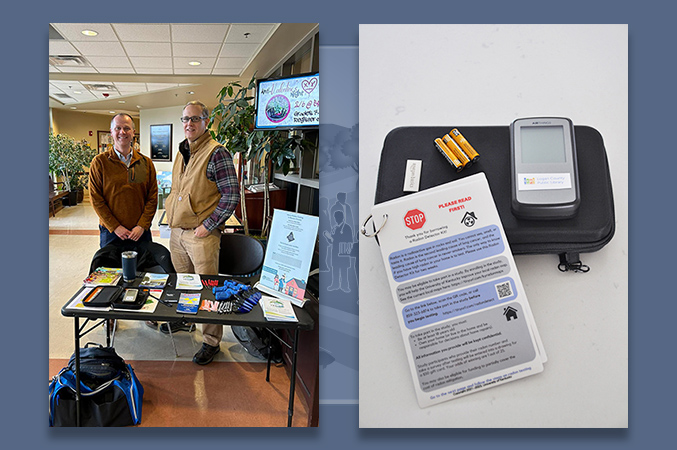
(Left) Community partners engaging library patrons about radon and the lending program during National Radon Action Month and (right) Radon detector kit including Airthings Corentium Home radon detector, 3 AAA batteries, instruction guide, and sturdy case. (Photos courtesy of Ellen Hahn)
In addition to the radon testing device, kits contained instruction cards describing how to use the detector, frequently asked questions, and a Radon Action Plan that explained how to interpret radon test numbers and what to do if the numbers were high, such as hiring a certified radon mitigation professional. Kits were lent for up to three weeks, allowing time for the patron to set up the radon detector in their home, allow the device to measure radon for two weeks, and then return the kit to the library.
Community Members Find Library Lending Program Effective
Researchers invited anyone who borrowed a kit to join the research study to evaluate the program’s effectiveness. Community members were able to check out kits from libraries regardless of whether they participated in the study. Of 319 community members who checked out kits, 86 participated in the study, which included an online form to record radon test results, a demographic and housing survey, and a post-testing survey that examined what participants thought about the kits. For community members without internet access, kits contained a radon data collection card on which they could keep track of their data and, after enrolling, they were mailed a paper copy of the surveys to complete and return.
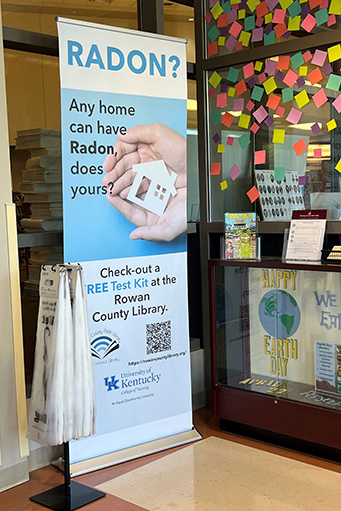
Radon detector kit marketing a public library. (Photo courtesy of Ellen Hahn)
Participants expressed that the testing devices worked as expected and that materials provided in the kits were easy to understand and helpful for completing radon testing. Most participants indicated they were likely to recommend the library lending program to others.
“It was striking to see that just under half of the study participants learned they were living with high radon levels, and most of these individuals had been in their homes for a long time, some over 20 years, without having previously tested for radon,” stated Hahn. “This reinforces the importance of getting radon detectors out to the public and raising awareness of the risks of radon exposure.”
Most participants whose test levels indicated a need for remediation stated they were likely to hire a mitigation professional but that financial assistance would be helpful.
Overall, the study showed library lending programs are feasible ways to get radon detectors to those who may otherwise not test for radon, either due to a lack of awareness about the risk of radon, low financial means to obtain a radon test device, or both. This is particularly helpful for rural communities where there are low rates of radon testing and high risk for exposure. The program demonstrated that libraries have an interest in improving the public’s health and may therefore be critical partners in addressing environmental justice concerns by reaching and educating populations who are typically marginalized.
The research team noted that further research is needed to understand low radon testing rates in rural communities and ways to increase testing, either through policy change to increase testing accessibility, or outreach to raise awareness of radon risks.
NIH-Funded Team Creates Vaccine Messaging That Reflects Community Values
NIH-funded researchers from the Colorado Community Engagement Alliance Against Health Disparities Regional Team published a paper in January 2024 on creating culturally sensitive messaging on COVID-19 vaccination information targeted toward communities disproportionately affected by the COVID-19 pandemic. The team used a modified Boot Camp Translation method to create messaging that reflected community attitudes, culture, and experiences. The method is based on community engagement and aims to translate medical information into interventions tailored to local contexts to improve uptake of evidence-based guidelines in diverse communities. Researchers and community members selected messages and strategies that specifically addressed the cultural context of their target audiences. For example, in creating messages for urban Native Americans and Alaska Natives, the team avoided negative imagery, featured positive imagery of local landscapes and Native attire, and incorporated imagery such as a hummingbird, symbolizing hope, and footsteps, symbolizing steps toward the future. The authors suggest using the modified Boot Camp Translation method whenever communicating health information requires speed and community-specific messaging because such tailored messaging can help support equitable health outcomes.
Toolkit Helps Public Health Professionals Prepare Talks on Climate and Health for High Schoolers
The American Public Health Association published a climate and health youth education toolkit with a lesson plan and other materials to help public health professionals give talks to high school students. The toolkit was created by the association’s Center for Climate, Health and Equity in partnership with the Children’s Environmental Health Committee, and the lesson plan was developed from NIH resources. A webinar explaining how to use the toolkit is available. It covers topics such as how climate change affects children’s health, how to adapt the toolkit for a particular audience, and what role health professionals play in educating children.
U.S. Environmental Protection Agency Announces New Collection of Environmental Justice Resources
The EPA announced its Environmental Justice (EJ) Clearinghouse, an online collection of federal and non-federal EJ resources intended to support President Joe Biden’s commitment to environmental justice. The collection helps ensure all EJ stakeholders and advocates have easy access to information from across the country. The initial resources in the collection were submitted by federal government agencies and include funding opportunities, screening and mapping tools, and technical assistance. The agency’s Office of Environmental Justice and External Civil Rights will add information to the collection on a rolling basis and welcomes input and submissions from the public for potential inclusion.
Wildfires Increase Emergency Department Visits Related to Mental Health
A group of NIEHS-funded researchers published a paper in February 2024 showing that wildfire smoke events increase anxiety-related emergency department visits. A wildfire smoke event is when wildfires become the main source of ambient pollution for a given ZIP code. The team analyzed data from satellites and almost 1.9 million emergency department visits in five states in the Western United States. The data also showed that women, girls, and older adults have more severe anxiety associated with wildfires than men and boys, suggesting a possible need for tailored risk communication. This study is one of the largest performed on the link between wildfire-related exposures and anxiety disorders.
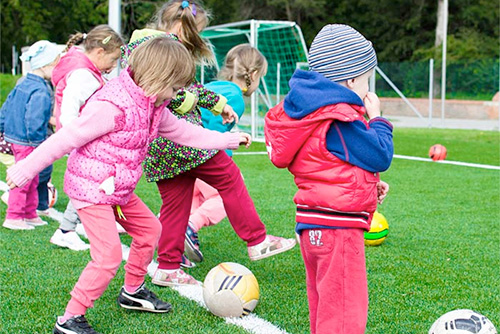
PEPH Environmental Health Chat Podcast Series
Artificial Turf and Your Health
PEPH Environmental Health Chat Podcast Series
Artificial Turf and Your Health
Although artificial turf is more durable and requires less upkeep than grass, playing on it may affect health. Artificial turf gets hotter than grass, so it may increase the risk of heat stress for people who play on such fields. Additionally, the synthetic material of artificial turf can expose people to PFAS, heavy metals, and other chemicals. In the latest PEPH podcast, Homero Harari, Sc.D., an exposure scientist, talks about the health concerns of playing on artificial turf and how communities can make informed decisions about whether to install artificial turf at schools, playgrounds, and parks.
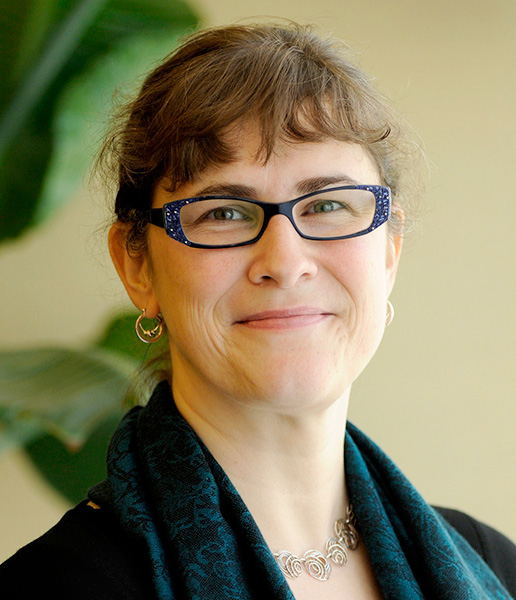
PEPH Grantee Highlight
Laura Senier, Ph.D.
Laura Senier, Ph.D., who holds a doctorate in sociology, was inspired to pursue work in environmental public health by personal experience. When she was a child, her cousin and other local children were diagnosed with acute lymphatic leukemia associated with exposure to industrial waste in drinking water. She is now driven to help communities similarly affected by toxic environmental exposures. Senier received an NIEHS Superfund Research Program Award for her graduate work helping residents advocate for a home loan program after home values plummeted upon discovery that the homes were built on a toxic waste site. Senier is now an associate professor of sociology and health sciences in Northeastern University’s Department of Sociology and Anthropology. She works on topics such as improving access to genomic screening and examining access to “blue space,” or water-based amenities, in Boston.
Funding Opportunities
Notice of Special Interest (NOSI): Women’s Health Research
In alignment with the White House Initiative on Women’s Health Research, the National Institutes of Health (NIH) is issuing this NOSI to highlight interest in receiving research applications focused on diseases and health conditions that predominantly affect women, present and progress differently in women (e.g., cardiovascular disease, HIV, reproductive aging and its implications), or are female-specific (e.g., uterine fibroids, endometriosis, menopause). NIEHS is interested in research in areas such as the role of environmental factors in fertility declines, the impacts on human development of environmental exposures, and the impact of climate change on diet/nutrition that presents challenges to food security and creates health risks for women, among other topics.
Deadline: June 5, 2024
NOSI: Data Informed, Place-Based Community-Engaged Research to Advance Health Equity
This NOSI is meant to stimulate community-engaged research that leverages geospatial data to probe the influence of geographic factors on disease development and health outcomes. Its goal is to use place-based research to help advance health equity in different communities. Applicants must select the institute or center and associated Notice of Funding Opportunity (NOFO) to use for submission of an application in response to the NOSI. NIEHS is interested in applications that integrate place-based environmental data with other data types and sources (such as human behavior and time-activity patterns, environmental data collected by low-cost sensor networks or wearable technologies, biomonitoring data, and other molecular or clinical outcome data) to improve exposure estimates at both the community and individual level, to advance understanding of the effects of environmental exposures on health outcomes, and to inform prevention and intervention strategies. Applicants may apply through PA-20-185 or PA-20-195.
Deadlines: June 5, 2024; October 5, 2024
Mentored Research Scientist Development Award (Parent K01 Independent Basic Experimental Studies with Humans Required)
Provides support and protected time (3 to 5 years) for an intensive, supervised career development experience in the biomedical, behavioral, or clinical sciences leading to research independence. All applications submitted to this funding opportunity must propose basic science experimental studies involving humans, otherwise referred to in NOT-OD-18-212 as “prospective basic science studies involving human participants,” that fall within the NIH definition of a clinical trial and also meet the definition of basic research. Companion funding opportunities are available for mentored research that is not categorized as a basic experimental study. The Mentored Research Scientist Development Award (Parent K01 - Independent Clinical Trial Not Allowed) supports research that does not involve leading an independent clinical trial, a clinical trial feasibility study, or an ancillary clinical trial, but applicants may propose a research experience in a clinical trial led by a mentor. The Mentored Research Scientist Development Award (Parent K01 - Independent Clinical Trial Required) supports applicants proposing to serve as the lead investigator of an independent clinical trial, a clinical trial feasibility study, or a separate ancillary study to an existing trial.
Deadlines: June 12, 2024; October 12, 2024
Academic Research Enhancement Award (AREA) for Undergraduate-Focused Institutions (R15 Clinical Trial Not Allowed)
Supports small scale research grants at institutions that do not receive substantial funding from NIH, with an emphasis on providing biomedical research experiences primarily for undergraduate students and enhancing the research environment at applicant institutions. The research project must involve undergraduate students and the research team must be composed primarily of undergraduate students. Student involvement in research may include participating in the design of experiments and controls, collecting and analyzing data, performing and troubleshooting experiments, presenting at meetings, drafting journal articles, participating in lab meetings to discuss results and future experiments, and other activities. NIEHS requires that applications submitted to this funding opportunity have a research focus on exposure-health-related responses from environmental agents within the mission interest of NIEHS (e.g., industrial chemicals or manufacturing byproducts, metals, pesticides, herbicides, air pollutants and other inhaled toxicants, particulates or fibers, fungal, and bacterial or biologically derived toxins).
Deadlines: June 25, 2024; October 25, 2024
NOSI: Promoting Data Reuse for Health Research
Promotes data reuse and secondary data analysis to drive advancements in biomedical, behavioral, clinical, or health-related research. For this NOSI, applications must:
- Focus on advancing scientific inquiry and addressing pivotal health research questions via data reuse or secondary data analysis.
- Include data from at least one publicly accessible, NIH-funded data repository or knowledgebase.
- Describe how results and best practices for data reuse are to be shared with NIH and the broader community.
Deadlines: July 3, 2024; November 4, 2024
Hazardous Materials Worker Health and Safety Training (U45 Clinical Trials Not Allowed)
Supports the development of model programs for the training and education of workers engaged in activities related to hazardous materials and waste generation, removal, containment, transportation, and emergency response. The major objective of this funding opportunity is to prevent work-related harm by assisting in training workers on how best to identify and protect themselves and their communities from exposure to hazardous materials encountered during hazardous waste operations and transportation and environmental restoration of contaminated facilities or chemical emergency response.
Deadline: July 9, 2024
NIH Pathway to Independence Award (Parent K99/R00 Independent Basic Experimental Studies with Humans Required)
Helps postdoctoral researchers complete needed mentored training and transition to independent tenure-track or equivalent faculty positions. The K99/R00 award is intended to foster the development of an independent research program that will be competitive for subsequent independent funding and that will help advance the mission of NIH. Candidates must have no more than four years of postdoctoral research experience at the time of the initial or the subsequent resubmission or revision application. All applications submitted to this NOFO must propose basic science experimental studies involving humans. Prospective studies with humans conducted with specific applications towards processes or products in mind, including Food and Drug Administration Phase 0 or 1 studies, mechanistic clinical trials (e.g., those that examine the mechanisms by which an intervention works or the processes that account for an intervention's effects on clinical outcome), and safety and efficacy studies should submit under NIH Pathway to Independence Award (Parent K99/R00 Independent Clinical Trial Required). Observational studies involving humans should submit under NIH Pathway to Independence Award (Parent K99/R00 Independent Clinical Trial Not Allowed).
Deadlines: July 12, 2024; October 12, 2024
NIH Support for Conferences and Scientific Meetings (Parent R13 Clinical Trial Not Allowed)
Supports high-quality scientific conferences that are relevant to NIH's mission and to public health. A conference is defined as a symposium, seminar, workshop, or any other organized and formal meeting, whether conducted face-to-face or via the internet, where individuals meet for the primary purpose of exchanging technical information and views or exploring or clarifying a defined subject, problem, or area of knowledge, whether or not a published report results from such meeting. NIH encourages conference grant applicants to enhance diversity by increasing the participation of individuals from diverse backgrounds, including those from underrepresented groups, in the planning, implementation, and participation in the proposed conference. Eligible organizations include higher education institutions, nonprofits, for-profit organizations, local government (including Indian/Native American Tribal Governments), federal government, and other organizations such as faith-based or community-based organizations.
Deadlines: August 12, 2024; December 12, 2024
Support for Research Excellence (SuRE) Award (R16 Clinical Trial Not Allowed)
Supports research capacity building at institutions that award baccalaureate and/or graduate degrees in biomedical sciences and receive limited NIH Research Project Grant funding. SuRE-supported projects must have student participation in the execution, analysis, and reporting of the research. An applicant institution must demonstrate a commitment to build its research capacity and support for the program director/principal investigator of the award. This funding opportunity requires a Plan for Enhancing Diverse Perspectives (PEDP) as described in NOT-MH-21-310, submitted as Other Project Information as an attachment (see Section IV). Applications submitted to this funding opportunity for consideration by NIEHS must have a research focus on exposure-health-related responses from environmental agents within the mission interest of NIEHS (e.g., industrial chemicals or manufacturing byproducts, metals, pesticides, herbicides, air pollutants and other inhaled toxicants, particulates or fibers, fungal, and bacterial or biologically derived toxins). The Support for Research Excellence – First Independent Research (SuRE-First) Award (R16 - Clinical Trial Not Allowed) is also open. The purpose of this funding opportunity is to support faculty investigators who have not had prior independent external research grants, to furnish students with high-quality undergraduate and/or graduate research experiences and to enhance the institutional scientific research culture.
Deadlines: September 27, 2024; May 28, 2025
Intervention Research to Improve Native American Health (R01 Clinical Trial Optional)
Supports research on interventions to improve health in Native American populations, including:
- Etiologic research that will directly inform intervention development or adaptations.
- Research that develops, adapts, or tests interventions for health promotion, prevention, treatment, or recovery.
- Where a sufficient body of knowledge on intervention efficacy exists, research on dissemination and implementation that develops and tests strategies to overcome barriers to the adoption, integration, scale-up, and sustainability of effective interventions.
The inclusion of Native American investigators serving on the study team or as the program director or principal investigator is strongly encouraged. This funding opportunity is part of the Intervention Research to Improve Native American Health initiative, which also includes Intervention Research to Improve Native American Health (R21 Clinical Trials Optional), and Intervention Research to Improve Native American Health (R34 Clinical Trial Optional). For the R01 and R21 funding mechanisms, NIEHS is interested in applications that focus on the development, adaptation, efficacy, effectiveness, implementation, or sustainability of culturally appropriate interventions to prevent or mitigate the health impacts of environmental exposures that disproportionately impact Native American populations. For the R34 funding mechanism, NIEHS is interested in applications that support the initial development of a culturally appropriate clinical trial or research project in preparation for health promotion or disease prevention interventions addressing the health impacts of environmental exposures that impact Native American populations.
Deadline: October 1, 2024
Environmental and Climate Justice Community Change Grants Program
EPA is accepting applications for its Environmental and Climate Justice Community Change Grants program. The program provides Inflation Reduction Act funds in environmental and climate justice activities to benefit disadvantaged communities through projects that reduce pollution, increase community climate resilience, and build community capacity to address environmental and climate justice challenges. These place-based investments will be focused on community-driven initiatives to be responsive to community and stakeholder input. The entities eligible to apply under this opportunity are:
- A partnership between two community-based nonprofit organizations.
- A partnership between a community-based nonprofit organization and one of the following:
- A federally recognized tribe.
- A local government.
- An institution of higher education.
Other organizations and entities may be able to participate and be involved in the Community Change Grants projects as collaborating subrecipients and/or procurement contractors selected in compliance with competition requirements. EPA is accepting applications on a rolling basis; therefore, interested applicants are encouraged to apply early. To apply for this opportunity, see the announcement on Grants.gov.
Deadline: November 21, 2024
Upcoming PEPH-related Events
Association for Advancing Participatory Sciences (AAPS): Conference for Advancing Participatory Sciences (virtual). This conference will include keynote presentations and panel discussions on topics related to participatory sciences. There will also be workshops and discussions focused on turning ideas into action and networking events. Registration for the AAPS conference is open.
National Environmental Health Association Webinar: Navigating Wildfire Smoke — Understanding, Mitigating, and Communicating Health Risks (virtual). Speakers will talk about what creates wildfires, the health impacts of wildfire smoke, the effects of wildfires on indoor air quality, and communication strategies. Registration for the webinar is available.
White House Environmental Justice Advisory Council Public Meeting (virtual). Speakers will talk about updates from the White House Council on Environmental Quality and from the White House Environmental Justice Advisory Council Workgroup. In conjunction with this meeting, members of the public are invited to submit comments related to carbon management and environmental justice issues affecting Indigenous people and Tribal nations. The deadline for comment submission is June 19, 2024. Registration for the public meeting is available.
National PFAS Conference (Ann Arbor, Michigan). The conference aims to provide support to communities affected by per- and polyfluoroalkyl substances (PFAS) and facilitate engagement across diverse sectors involved with PFAS to accelerate the protection of health and the environment. Attendees will identify the best methods to share findings and ensure ongoing communication between researchers, communities, and other PFAS-related sectors and will share information and resources responsive to needs identified by affected communities. The conference is partially funded by NIEHS. Registration for the National PFAS Conference is open.
Columbia University Mailman School of Public Health: Climate Change and Health Boot Camp — Building Skills and Knowledge for Effective Engagement (virtual). This three-day course will provide participants with skills to help improve their public health practice, prepare for impacts from climate change, and integrate climate change information into research and decision-making. Attendees will hear lectures and participate in class exercises and group discussions. Registration for the Climate Change workshop is available. This workshop is part of a series, the Columbia University Mailman School of Public Health: Skills for Health and Research Professionals Program, designed for health and research professionals from all career stages and focuses on providing practical skills.
Columbia Climate School: Extreme Heat Workshop (New York City, New York). Climate scientists, engineers, impact researchers, social scientists, and other public and private stakeholders will discuss emerging risks from extreme heat. Participants will assess the state of knowledge on heat hazards, identify community needs and research gaps, and discuss how to build societal resilience to extreme heat. This workshop is hosted by the Columbia Climate School and receives funding from both the National Science Foundation and Columbia Climate Center. The workshop registration deadline is June 15.
National Environmental Health Association’s Annual Educational Conference and Exhibition (Pittsburgh, Pennsylvania and virtual). This year’s theme is New Horizons: Building Bridges to Shape the Environmental Health Future. The conference will have educational sessions on topics such as air quality, climate change, heat waves, data modernization, and artificial intelligence for environmental health. You can view the conference agenda. Registration for the conference is available (including single-day options).
Columbia University Mailman School of Public Health: Environmental Justice and Environmental Health Disparities (Boston, Massachusetts and virtual). This intensive workshop will cover exposure assessment techniques and community engagement and health policy applications in support of solution-driven environmental justice research. The focus of this workshop is to provide training in environmental justice research to environmental health scientists and will include lectures and hands-on learning experiences. Registration for the Environmental Justice workshop is available. This workshop is part of a series, the Columbia University Mailman School of Public Health: Skills for Health and Research Professionals Program, designed for health and research professionals from all career stages and focuses on providing practical skills.
International Society for Environmental Epidemiology Annual Meeting: Addressing Challenges in Environmental Health, Justice, and Development (Santiago, Chile). Topics will include air pollution, the built environment, climate, exposures and exposure assessment methods, policy, and water pollution. Registration is now open.
International Society of Exposure Science Annual Meeting: Exposures that Impact Health in Vulnerable Populations (Montreal, Québec). Participants will hear about research in exposure science, epidemiology, toxicology, and risk assessments. The meeting will bring together participants from academia, government, and nonprofit organizations.
American Public Health Association (APHA) 2024 Annual Meeting and Expo (Minneapolis, Minnesota). The theme of the annual APHA meeting is Building Trust in Public Health and Science. The meeting will include a session on report-back as well as poster sessions and opportunities for networking. Registration for the APHA meeting and expo will open June 4.




